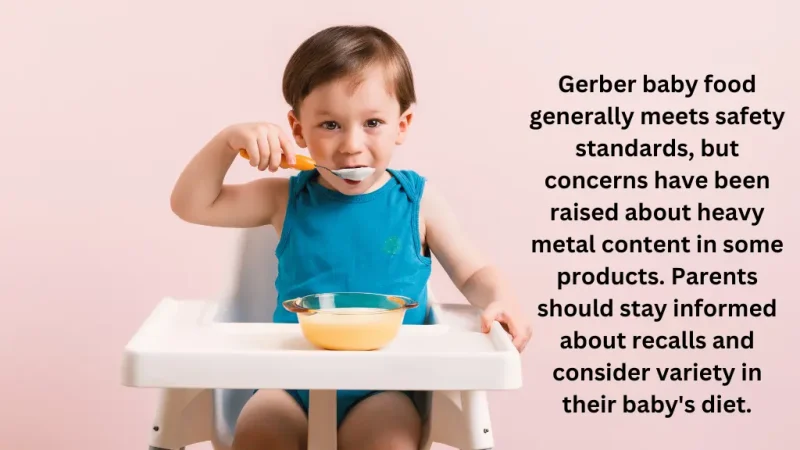Is Gerber Baby Food Safe? This question has been on the minds of many parents as they navigate the crucial task of feeding their infants. Gerber, a household name in baby nutrition, has been a trusted brand for decades.
Gerber baby food generally meets safety standards, but concerns have been raised about heavy metal content in some products. Parents should stay informed about recalls and consider variety in their baby’s diet.

In this article, we’ll explore the safety of Gerber baby food, examine current research, and provide insights to help parents make informed decisions about their baby’s nutrition.
Safety Standards and Regulations: Keeping Our Babies’ Food in Check
When it comes to our precious bundles of joy, we want nothing but the best, right? That’s why it’s crucial to understand the safety standards and regulations that govern baby food production in the United States.
FDA Oversight: The Watchful Eye on Baby Food
The Food and Drug Administration (FDA) plays a big role in ensuring that the food our babies eat is safe.
They’ve set up strict guidelines that all baby food manufacturers, including Gerber, must follow. These rules cover everything from ingredient quality to packaging safety.
USDA Involvement: From Farm to High Chair
The United States Department of Agriculture (USDA) also gets in on the action, especially when it comes to organic baby foods.
They make sure that any product labeled “organic” meets specific standards for pesticide use, fertilizers, and other farming practices.
Ingredients and Sourcing: What’s Really in That Jar?
Now, let’s talk about what goes into Gerber baby food. After all, we want to know exactly what we’re feeding our little ones, don’t we?
Fruit and Vegetable Sourcing
Gerber claims to source their fruits and vegetables from trusted farmers. They say they work closely with these growers to ensure the produce meets their quality standards. But what does that really mean?
Organic vs. Conventional Options
Gerber offers both organic and conventional baby food options. The organic line is free from synthetic pesticides and fertilizers, while the conventional line may contain trace amounts of these substances (within FDA-approved limits, of course).
Additives and Preservatives
Here’s where things get a bit tricky. While Gerber states that they use minimal additives and preservatives, some of their products do contain added ingredients like ascorbic acid (vitamin C) to maintain color and flavor. It’s always a good idea to read those labels carefully!
Manufacturing Process: From Farm to Jar
Ever wondered how those little jars of baby food are made? Let’s peek behind the curtain at Gerber’s manufacturing process.
Quality Control Measures
Gerber boasts about their rigorous quality control measures. They claim to test their products at various stages of production to ensure safety and quality. But what exactly are they testing for?
Processing Methods
The company uses different processing methods depending on the product. For example, some fruits and veggies are pureed fresh, while others might be cooked before pureeing. These methods can affect the nutritional content and taste of the final product.
Is Gerber Baby Food Safe to Eat?
Gerber follows FDA and USDA regulations, which means their products are generally considered safe for consumption.
However, recent reports have raised some concerns about heavy metal content in baby foods, including Gerber products. We’ll dive into that a bit later.
Is There Any Physical Change in the Child Who Eats Gerber Baby Food?
Parents often wonder if they’ll notice any physical changes in their baby after starting on Gerber food. Let’s break it down:
Growth and Development
Gerber baby food is designed to provide essential nutrients for growing babies. When introduced as part of a balanced diet, you might notice your little one hitting those growth milestones right on schedule.
Digestive Changes
As with any new food, you might see some changes in your baby’s digestion. This could include changes in stool color or consistency. Don’t worry – this is usually normal as your baby’s tummy adjusts to solid foods.
Allergic Reactions
While rare, some babies might have allergic reactions to certain ingredients in Gerber foods. Always watch for signs like rashes, vomiting, or difficulty breathing when introducing new foods.
Nutritional Value: What’s Your Baby Getting?
Let’s talk nutrition! Here’s a quick look at what you might find in a typical Gerber baby food product:
| Nutrient | Amount per 100g | % Daily Value |
|---|---|---|
| Calories | 50-100 | Varies |
| Protein | 1-3g | 2-6% |
| Carbohydrates | 10-20g | 3-7% |
| Fiber | 1-3g | 4-12% |
| Vitamin C | 10-30mg | 11-33% |
| Iron | 0.5-1.5mg | 3-8% |
Remember, these values can vary depending on the specific product and flavor. Always check the label for the most accurate information.
Does Gerber Baby Food Still Contain Heavy Metals?
Alright, let’s address the elephant in the room. There’s been a lot of buzz about heavy metals in baby food lately, and Gerber has been part of that conversation.
The Congressional Report
In 2021, a U.S. Congressional report found that several baby food brands, including Gerber, contained higher levels of heavy metals like arsenic, lead, cadmium, and mercury than many experts consider safe.
Gerber’s Response
Gerber has stated that their products are safe and that they’re working to reduce heavy metal levels even further. They argue that these metals are naturally occurring in soil and water, making it challenging to eliminate them completely.
Current Status
As of now, Gerber (like other baby food manufacturers) is not required to test finished products for heavy metals or disclose levels on labels. However, pressure is mounting for stricter regulations in this area.
What Do Consumer Reports Say About Gerber Baby Food Safety?
Consumer Reports, a trusted non-profit organization, has weighed in on the baby food safety issue. Here’s what they’ve had to say:
Heavy Metal Testing
Consumer Reports conducted their own tests on baby foods, including Gerber products. They found that many baby foods, not just Gerber’s, contained concerning levels of heavy metals.
Recommendations
While they don’t advise parents to panic, Consumer Reports suggests:
- Varying your baby’s diet
- Limiting rice-based products (which tend to have higher arsenic levels)
- Choosing fresh fruits and vegetables when possible
Calls for Stricter Regulations
Consumer Reports has been vocal about the need for stricter regulations on heavy metals in baby foods. They’re pushing for manufacturers to be more transparent about their testing and results.
Alternatives and Comparisons: Exploring Your Options
Feeling a bit overwhelmed? Don’t worry – you’ve got options! Let’s compare Gerber to some alternatives:
| Brand | Pros | Cons |
|---|---|---|
| Gerber | – Wide availability – Variety of options – Affordable | – Concerns about heavy metals – Some products contain additives |
| Homemade Baby Food | – Full control over ingredients – Can be more cost-effective – Fresher | – Time-consuming – Shorter shelf life – Requires knowledge of baby nutrition |
| Organic Brands (e.g., Earth’s Best, Happy Baby) | – Organic ingredients – Often fewer additives | – More expensive – May still contain some heavy metals |
| Baby-Led Weaning | – Promotes self-feeding skills – Exposes baby to variety of textures | – Requires close supervision – Can be messy – Not suitable for all babies |
Remember, there’s no one-size-fits-all solution. What works best for your family might be a combination of these options!
Consumer Reports and Recalls: Staying Informed
Keeping up with the latest safety information is crucial. Here’s how you can stay in the loop:
Recent Recalls
As of my last update, Gerber hasn’t had any major recalls related to food safety. However, it’s always a good idea to regularly check the FDA’s recall list or sign up for their alerts.
Consumer Feedback
Many parents share their experiences with Gerber products online. While individual experiences can vary, reading these can give you a sense of real-world use.
Expert Opinions
Pediatricians and nutritionists often weigh in on baby food safety. Don’t hesitate to ask your child’s doctor for their professional opinion on Gerber and other baby food brands.
Conclusion: Making the Best Choice for Your Baby
Whew! We’ve covered a lot of ground, haven’t we? Let’s wrap this up with some key takeaways:
- Gerber follows FDA regulations, making their products generally safe for consumption.
- However, concerns about heavy metals in Gerber and other baby foods have been raised.
- Variety is key – try to mix up your baby’s diet with different brands and homemade options.
- Stay informed about recalls and new research.
- Trust your instincts and consult with your pediatrician if you have concerns.
Remember, you’re doing a great job, parents! Navigating the world of baby food can feel like a maze, but armed with information, you’re well-equipped to make the best choices for your little one.
Every baby is unique, and what works for one might not work for another. It’s all about finding the right balance for your family. So take a deep breath, trust your gut, and know that you’ve got this!
Now, go give that little munchkin a cuddle – you’ve earned it after all this baby food detective work!

2 thoughts on “Is Gerber Baby Food Safe? A Parent’s Guide to Making Informed Choices”